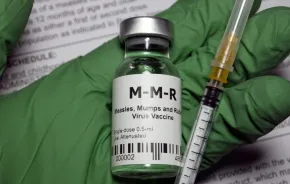“Ashley’s mother was concerned about her daughter’s constant dieting. It started when Ashley — a bright, energetic 15-year-old cheerleader — and her two best friends decided to go on a diet before trying out for the varsity cheerleading squad. They cut out junk food and, instead of eating lunch, began walking around the track. After the tryouts, Ashley’s girlfriends stopped dieting and discontinued their lunchtime walks. Ashley, however, started running at lunch and sometimes before school. She also began restricting her diet more, first by eliminating breads and cereals, and then eliminating meat and chicken. When Ashley came to my clinic, I diagnosed that she had developed an eating order and explained to her parents that she needed to be hospitalized because of a weakened heart. Her mom couldn’t understand why Ashley’s diet had gotten out of control while her friends were fine.”
— Dr. Pamela Carlton,
pediatrician and specialist in adolescent medicine and eating disorders
pediatrician and specialist in adolescent medicine and eating disorders
 When can a diet turn into an eating disorder? Carlton explains that an eating disorder is not just a diet that has gotten out of control, it’s “a coping mechanism to deal with external stress, or a way to gain control over something concrete, such as food or weight.
When can a diet turn into an eating disorder? Carlton explains that an eating disorder is not just a diet that has gotten out of control, it’s “a coping mechanism to deal with external stress, or a way to gain control over something concrete, such as food or weight.
“At some undefined point, the child stops controlling the diet and the diet takes control of the child,” Carlton says.
Some eating disorders begin with dieting for a specific event, such as prom, spring break or sports tryouts. But they may also be triggered by major life changes (moving, a new school, divorce); losses (death, breakup with a romantic partner, ending friendships); or seemingly small traumas, such as getting cut from a team, being teased about weight or being dateless on dance night.
Carlton describes eating disorders as “psychiatric illnesses with potentially devastating, life-threatening medical consequences.” She says, it’s very difficult for even the most observant parent to immediately recognize an eating disorder. Although their cause is not yet fully understood, Carlton says research indicates that these disorders are influenced by a combination of psychological, developmental, social, cultural, genetic and neurochemical factors.
Teens who periodically announce, “I’m going on a diet,” and decide to cut out dessert or junk food probably do not have (and are unlikely to develop) an eating disorder. But parents may have reason to be concerned if they notice sudden or dramatic changes in their child’s eating or attitude.
Warning signs that a teen’s dieting is getting out of control may include:
- Refusal to eat certain foods, then completely eliminating an entire food group (meat, sweets, carbohydrates)
- Development of food rituals, such as eating foods in a certain order, cutting food into tiny pieces or rearranging food on a plate
- Excessive use of low-calories condiments such as salt, mustard and artificial sweetener
- Tendency to eat alone
- Consistent excuses for avoiding family meal times or situations that involve food
- Constant denial of hunger
- Continued dieting despite significant weight loss
- Frequent comments about feeling “fat” or overweight, despite an obvious weight loss
- Anxiety about gaining weight or being fat
- Suddenly only wearing large or baggy clothes (to disguise weight loss)
William Walters, coordinator of the Information and Referral Hotline for the Seattle-based National Eating Disorders Association, says that other warning signs include a preoccupation with counting calories and checking weight on a scale.
But not all danger signs are easily observed, especially those for bulimia, because a bulimic teen can seem to be at a healthy weight and physically active and fit. Walters says indications of bulimia are not always obvious, since they may involve self-induced vomiting, use of laxatives or obsessive exercise.
Clues to bulimia include:
- Lots of candy wrappers in the trash or food disappearing from the pantry — even though a teen is on a diet or appears to be eating normally
- Considerable time spent in the bathroom after meals, often with the shower running (to cover the sounds of vomiting)
What to do?
First, make an appointment with a pediatrician, Carlton says, and go with your gut if the doctor says everything is fine but you suspect something else. Many doctors — even pediatricians — aren’t taught to recognize when a diet has turned into an eating disorder; your next step is to contact a specialist.
In a society obsessed with weight, body image and being thin, it’s not surprising that today’s teenagers talk about being “fat” or needing to lose weight. Parents, however, can help their children develop positive attitudes about their body to discourage dieting. Walters encourages parent to think about their own comments about food, weight and nutrition. Do you say things like “I was so bad today — I ate two brownies,” or “I hate bathing suit shopping because my thighs are so fat”?
Even seemingly positive comments can backfire (like “Aunt Susie really looks great since she lost weight”). Make an effort to avoid discussing the weight and physical fitness of others, including celebrities.
Negative messages aren’t always verbal. This hit home for Carlton when she went on a school field trip with her son, Noah. “When we stopped for ice cream, I and one other mother were the only adults who ordered ice cream and didn’t make a reference to weight. It’s OK to enjoy an ice cream cone on a hot summer day!”
Deborah Ashin is a Mercer Island freelance writer with 18-year-old twins. She and Dr. Pamela Carlton wrote Take Charge of Your Child’s Eating Disorder, which was selected by the Library Journal as one of the best self-help books of 2007.
Dr. Laura Kastner blogs on this topic on ParentMap's blog page.









